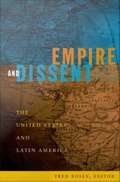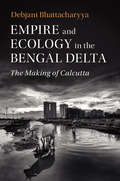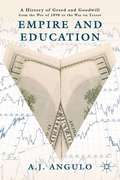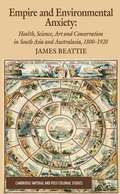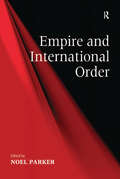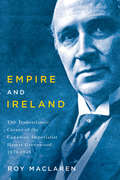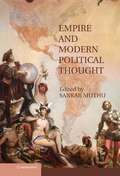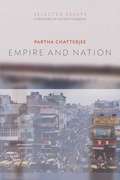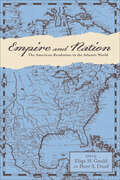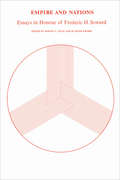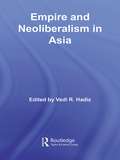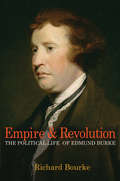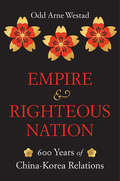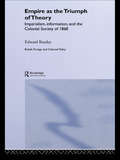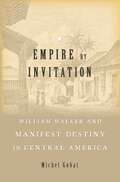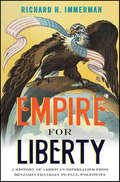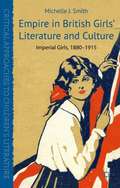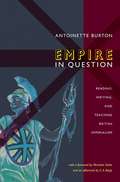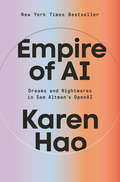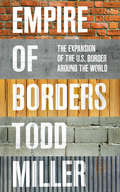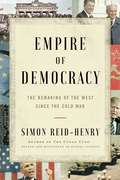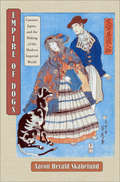- Table View
- List View
Empire and Dissent: The United States and Latin America
by Fred RosenSince the early nineteenth century, the United States has repeatedly intervened in the affairs of Latin American nations to pursue its own interests and to "protect" those countries from other imperial powers or from internal "threats. " The resentment and opposition generated by the encroachment of U. S. power has been evident in the recurrent attempts of Latin American nations to pull away from U. S. dominance and in the frequent appearance of popular discontent and unrest directed against imperialist U. S. policies. In Empire and Dissent, senior Latin Americanists explore the interplay between various dimensions of imperial power and the resulting dissent and resistance. Several essays provide historical perspective on contemporary U. S. -hemispheric relations. These include an analysis of the nature and dynamics of imperial domination, an assessment of financial relations between the United States and Latin America since the end of World War II, an account of Native American resistance to colonialism, and a consideration of the British government's decision to abolish slavery in its colonies. Other essays focus on present-day conflicts in the Americas, highlighting various modes of domination and dissent, resistance and accommodation. Examining southern Mexico's Zapatista movement, one contributor discusses dissent in the era of globalization. Other contributors investigate the surprisingly conventional economic policies of Brazil's president, Luiz Incio Lula da Silva; Argentina's recovery from its massive 2001 debt default; the role of coca markets in the election of Bolivia's first indigenous president, Evo Morales; and the possibilities for extensive social change in Venezuela. A readers' guide offers a timeline of key events from 1823 through 2007, along with a list of important individuals, institutions, and places. Contributors: Daniel A. Cieza, Gregory Evans Dowd, Steve Ellner, Neil Harvey, Alan Knight, Carlos Marichal, John Richard Oldfield, Silvia Rivera, Fred Rosen, Jeffrey W. Rubin
Empire and Ecology in the Bengal Delta: The Making Of Calcutta (Studies In Environment And History )
by Debjani BhattacharyyaWhat happens when a distant colonial power tries to tame an unfamiliar terrain in the world's largest tidal delta? <P><P>This history of dramatic ecological changes in the Bengal Delta from 1760 to 1920 involves land, water and humans, tracing the stories and struggles that link them together. Pushing beyond narratives of environmental decline, Bhattacharyya argues that 'property-thinking', a governing tool critical in making land and water discrete categories of bureaucratic and legal management, was at the heart of colonial urbanization and the technologies behind the draining of Calcutta. The story of ecological change is narrated alongside emergent practices of land speculation and transformation in colonial law. Bhattacharyya demonstrates how this history continues to shape our built environments with devastating consequences, as shown in the Bay of Bengal's receding coastline.<P> The first environmental history of land markets in South Asia.<P> Explores how the law responded to the ecological changes of the Bengal delta and how those laws continue to shape our contemporary relationship to the land and the water.<p> Shows landscapes as essentially fluid and changeable, destabilizing the fixities of cartography.
Empire and Education
by A. J. AnguloThis book is about education and American imperialism from the War of 1898 to the War on Terror. Very little coordinated or sustained research has been devoted to the broader contours of America, education, and empire. And third, this volume seeks to inspire new directions in the study of American educational history.
Empire and Environmental Anxiety
by James BeattieA new interpretation of imperialism and environmental change, and the anxieties imperialism generated through environmental transformation and interaction with unknown landscapes. Tying together South Asia and Australasia, this book demonstrates how environmental anxieties led to increasing state resource management, conservation, and urban reform.
Empire and International Order
by Noel ParkerEmpires have returned as features of the international scene. With the Cold War's global ideological contest gone, alternative structures such as the War on Terror or the Clash of Civilizations losing credibility, and even the unipolar position of the USA no longer self-evident, the operations of competing empires, history's best known form of order imposed over territories and peoples, acquires renewed credibility. Empire and International Order presents a critical examination of how useful the concept of empire is for understanding varieties of international order across time and place. Original contributions from an international team of upcoming and distinguished scholars analyse a wealth of theoretical approaches alongside contemporary themes enabling the reader to understand the desire to shift the ground of analysis away from the current literature of immediate issue of the US towards the disciplines of international relations, politics, and political/sociological theory.
Empire and Ireland: The Transatlantic Career of the Canadian Imperialist Hamar Greenwood, 1870-1948
by Roy MaclarenIn Empire and Ireland, Roy MacLaren recounts the life and political career of Hamar Greenwood, a young man from rural Canada who reached the imperial pinnacle of the British cabinet. Greenwood’s arduous route was first beset by conservative opposition to his liberal convictions and later by hostility towards his role as chief secretary for Ireland under British prime minister Lloyd George during the tumultuous years of 1920 to 1922. A long-time advocate of Home Rule for Ireland, Greenwood endeavoured to provide Ireland with the same Dominion status as Canada. Dominion Home Rule, however, was not enough for Irish Republicans, who blamed him for the "Black and Tan” reprisals carried out by the British, and too much for Conservative Unionists, who believed he was insufficiently hard line. Eventually abandoning the divided Liberals for the Conservatives, he entered the House of Lords as Viscount Greenwood. By then Britain could no longer sustain an empire which, in his eyes, had been a cradle for justice, liberty, and development. The first biography of Hamar Greenwood, MacLaren’s thought-provoking work also illuminates the meaning of liberal imperialism, a significant factor in political thinking and policy formation throughout the global empire in Greenwood’s time, which still has resonance today.
Empire and Ireland: The Transatlantic Career of the Canadian Imperialist Hamar Greenwood, 1870–1948
by Roy MacLarenIn Empire and Ireland, Roy MacLaren recounts the life and political career of Hamar Greenwood, a young man from rural Canada who reached the imperial pinnacle of the British cabinet. Greenwood’s arduous route was first beset by conservative opposition to his liberal convictions and later by hostility towards his role as chief secretary for Ireland under British prime minister Lloyd George during the tumultuous years of 1920 to 1922. A long-time advocate of Home Rule for Ireland, Greenwood endeavoured to provide Ireland with the same Dominion status as Canada. Dominion Home Rule, however, was not enough for Irish Republicans, who blamed him for the “Black and Tan” reprisals carried out by the British, and too much for Conservative Unionists, who believed he was insufficiently hard line. Eventually abandoning the divided Liberals for the Conservatives, he entered the House of Lords as Viscount Greenwood. By then Britain could no longer sustain an empire which, in his eyes, had been a cradle for justice, liberty, and development. The first biography of Hamar Greenwood, MacLaren’s thought-provoking work also illuminates the meaning of liberal imperialism, a significant factor in political thinking and policy formation throughout the global empire in Greenwood’s time, which still has resonance today.
Empire and Modern Political Thought
by Sankar MuthuThis collection of original essays by leading historians of political thought examines modern European thinkers' writings about conquest, colonization and empire. The creation of vast transcontinental empires and imperial trading networks played a key role in the development of modern European political thought. The rise of modern empires raised fundamental questions about virtually the entire contested set of concepts that lay at the heart of modern political philosophy, such as property, sovereignty, international justice, war, trade, rights, transnational duties, civilization and progress. From Renaissance republican writings about conquest and liberty to sixteenth-century writings about the Spanish conquest of the Americas through Enlightenment perspectives about conquest and global commerce and nineteenth-century writings about imperial activities both within and outside of Europe, these essays survey the central moral and political questions occasioned by the development of overseas empires and European encounters with the non-European world among theologians, historians, philosophers, diplomats and merchants.
Empire and Nation: Selected Essays
by Partha ChatterjeePartha Chatterjee is one of the world's greatest living theorists on the political, cultural, and intellectual history of nationalism. Beginning in the 1980s, his work, particularly within the context of India, has served as the foundation for subaltern studies, an area of scholarship he continues to develop. In this collection, English-speaking readers are finally able to experience the breadth and substance of Chatterjee's wide-ranging thought. His provocative essays examine the phenomenon of postcolonial democracy and establish the parameters for research in subaltern politics. They include an early engagement with agrarian politics and Chatterjee's brilliant book reviews and journalism. Selections include one never-before-published essay, "A Tribute to the Master," which considers through a mock retelling of an episode from the classic Sanskrit epic, The Mahabharata, a deep dilemma in the study of postcolonial history, and several Bengali essays, now translated into English for the first time. An introduction by Nivedita Menon adds necessary context and depth, critiquing Chatterjee's ideas and their influence on contemporary political thought.
Empire and Nation: The American Revolution in the Atlantic World (Anglo-America in the Transatlantic World)
by Eliga H. Gould and Peter S. OnufA look at America’s revolution in the context of the larger British empire: “Many interesting essays . . . a valuable scholarly contribution.” —Journal of Colonialism and Colonial HistoryHow did events and ideas from elsewhere in the British empire influence development in the thirteen American colonies? And what was the effect of the American Revolution on the wider Atlantic world? In Empire and Nation, leading historians reconsider the American Revolution as a transnational event, with many sources and momentous implications for Ireland, Africa, the West Indies, Canada, and Britain itself.The opening section of the book situates the origins of the American Revolution in the commercial, ethnic, and political ferment that characterized Britain’s Atlantic empire at the close of the Seven Years’ War. The empire experienced extraordinary changes, ranging from the first stirrings of nationalism in Ireland to the dramatic expansion of British rule in Canada, Africa, and India. The second part focuses on the rebellion of the thirteen colonies, touching on slavery and ethnicity, the changing nature of religious faith, and ideas about civil society and political organization. Finally, contributors examine the changes wrought by the American Revolution both within Britain’s remaining imperial possessions and among the other states in the emerging “concert of Europe.” These essays challenge assumptions about the “exceptional” character of the republic’s founding moment—even as they invite readers to think anew about the complex ways in which the Revolution reshaped both American society and the Atlantic world.
Empire and Nations: Essays in Honour of Frederic H. Soward
by H. Peter Krosby Harvey DyckEmpire and Nations was written in tribute to the accomplishments of Frederic Hubert Soward – teacher, scholar, and administrator – who for forty-two years served in the Department of History at the University of British Columbia. Throughout his career he has made significant contributions to international understanding and the study of international relations through his writings, public lectures, and participation in international organizations and conferences. The volume consists of essays by fourteen outstanding contributors, all of whom are former students or associates of Professor Soward. The essays have as their common subject the nations that evolved within the British Empire and found, or are finding, their place in the world. Papers written by John Conway, Harvey L. Dyck, G.P. de T. Glazebrook, Edward D. Greathed, John W. Holmes, R.A. MacKay, Norman A.M. MacKenzie, Kenneth A. MacKirdy, H. Blair Neatby, and Peter B. Waite develop the subject from the perspectives of nation-building in Canada and Canada's developing the role in world affairs. Peter Harnetty, Jane Banefield Haynes, and J. Bertin Webster contribute studies of nationalism and empire in Asia and Africa. Also included in the volume are a biographical introduction by Margaret A. Ormsby, a list of the writings of F.H. Soward compiled by Eleanor Mercer, and a tribute to Professor Soward by Lester B. Pearson.
Empire and Neoliberalism in Asia (Politics in Asia)
by Vedi R. HadizThis book analyzes the overall effect of American primacy on social and political conflicts in Asia, discussing how the post-Cold War American agenda does not promote democratization in the region, in contradiction to one of the major proclaimed aims of the proponents of the Pax Americana. This team of renowned scholars argue that the US agenda can strengthen anti-democratic impulses in Asian societies, exacerbating and complicating existing domestic conflicts and struggles. Empire and Neoliberalism in Asia also examines how the requirements of the War on Terror intersect with, and reinforce, those of transnationalized sections of American capital. Drawing on country case studies, this multidisciplinary book looks at the ramifications of the American Empire for the Asian region and will appeal to anyone interested in Asian politics, international relations, political economy, development studies and sociology.
Empire and Revolution
by Richard BourkeEdmund Burke (1730-97) lived during one of the most extraordinary periods of world history. He grappled with the significance of the British Empire in India, fought for reconciliation with the American colonies, and was a vocal critic of national policy during three European wars. He also advocated reform in Britain, pressed for constitutional change in Ireland, and became a central protagonist in the great debate on the French Revolution. Drawing on the complete range of printed and manuscript sources, Empire and Revolution offers a vivid reconstruction of the major concerns of this outstanding statesman, orator, and philosopher.In restoring Burke to his original political and intellectual context, this book strips away the accumulated distortions that have marked the reception of his ideas. In the process, it overturns the conventional picture of a partisan of tradition against progress. In place of the image of a backward-looking opponent of popular rights, it presents a multifaceted portrait of one of the most captivating figures in eighteenth-century life and thought. While Burke was a passionately energetic statesman, he was also a deeply original thinker. Empire and Revolution depicts him as a philosopher-in-action who evaluated the political realities of the day through the lens of Enlightenment thought, variously drawing on the ideas of such figures as Montesquieu, Rousseau, and Hume.A boldly ambitious work of scholarship, this book challenges us to rethink the legacy of Burke and the turbulent era in which he played so pivotal a role.
Empire and Righteous Nation: 600 Years Of China-korea Relations (Edwin O Reischauer Lectures (hup) Ser. #14)
by Odd Arne WestadFrom an award-winning historian, a concise overview of the deep and longstanding ties between China and the Koreas, providing an essential foundation for understanding East Asian geopolitics today.In a concise, trenchant overview, Odd Arne Westad explores the cultural and political relationship between China and the Koreas over the past 600 years.Koreans long saw China as a mentor. The first form of written Korean employed Chinese characters and remained in administrative use until the twentieth century. Confucianism, especially Neo-Confucian reasoning about the state and its role in promoting a virtuous society, was central to the construction of the Korean government in the fourteenth century. These shared Confucian principles were expressed in fraternal terms, with China the older brother and Korea the younger. During the Ming Dynasty, mentor became protector, as Korea declared itself a vassal of China in hopes of escaping ruin at the hands of the Mongols. But the friendship eventually frayed with the encroachment of Western powers in the nineteenth century. Koreans began to reassess their position, especially as Qing China seemed no longer willing or able to stand up for Korea against either the Western powers or the rising military threat from Meiji Japan. The Sino-Korean relationship underwent further change over the next century as imperialism, nationalism, revolution, and war refashioned states and peoples throughout Asia. Westad describes the disastrous impact of the Korean War on international relations in the region and considers Sino-Korean interactions today, especially the thorny question of the reunification of the Korean peninsula.Illuminating both the ties and the tensions that have characterized the China-Korea relationship, Empire and Righteous Nation provides a valuable foundation for understanding a critical geopolitical dynamic.
Empire and the Meaning of Religion in Northeast Asia
by Dubois Thomas DavidManchuria entered the twentieth century as a neglected backwater of the dying Qing dynasty, and within a few short years became the focus of intense international rivalry to control its resources and shape its people. This book examines the place of religion in the development of Manchuria from the late nineteenth century to the collapse of the Japanese Empire in 1945. Religion was at the forefront in this period of intense competition, not just between armies but also among different models of legal, commercial, social and spiritual development, each of which imagining a very specific role for religion in the new society. Debates over religion in Manchuria extended far beyond the region, and shaped the personality of religion that we see today. This book is an ambitious contribution to the field of Asian history and to the understanding of the global meaning and practice of the role of religion.
Empire as the Triumph of Theory: Imperialism, Information and the Colonial Society of 1868
by Edward BeasleyWho were the first people to invent a world-historical mission for the British Empire? And what were the constituencies behind the development of the imperialistic thinking in mid-Victorian England? These questions are vital for understanding where the New Imperialism of the late nineteenth century came from. Empire as the Triumph of Theory takes as its sample the more than two hundred earliest members of the first major pro-imperial pressure group: the Colonial Society (founded in 1868, it is now the Royal Commonwealth Society).The book goes on to a careful and well-written tour of the different parts of the Victorian world, putting the founders of the Colonial society into their social contexts. Empire as the Triumph of Theory concludes that imperialism was developed less by investors and office holders than by people who, whatever their other activities, had written books or articles about the cultures of the world. Victorian activities around the globe were multitudinous and varied, and general ideas about England's imperial mission were, in fact, constructed by members of the Colonial Society, in order to make sense out of information flowing in from this teeming world.This is the first work to explore the social and intellectual origins of the Colonial Society. It brings the mid-Victorians to life, and should become a standard work for specialists on imperialism.
Empire by Invitation: William Walker and Manifest Destiny in Central America
by Michel GobatMichel Gobat traces the untold story of the rise and fall of the first U.S. overseas empire to William Walker, a believer in the nation’s manifest destiny to spread its blessings not only westward but abroad as well. In the 1850s Walker and a small group of U.S. expansionists migrated to Nicaragua determined to forge a tropical “empire of liberty.” His quest to free Central American masses from allegedly despotic elites initially enjoyed strong local support from liberal Nicaraguans who hoped U.S.-style democracy and progress would spread across the land. As Walker’s group of “filibusters” proceeded to help Nicaraguans battle the ruling conservatives, their seizure of power electrified the U.S. public and attracted some 12,000 colonists, including moral reformers. But what began with promises of liberation devolved into a reign of terror. After two years, Walker was driven out. Nicaraguans’ initial embrace of Walker complicates assumptions about U.S. imperialism. Empire by Invitation refuses to place Walker among American slaveholders who sought to extend human bondage southward. Instead, Walker and his followers, most of whom were Northerners, must be understood as liberals and democracy promoters. Their ambition was to establish a democratic state by force. Much like their successors in liberal-internationalist and neoconservative foreign policy circles a century later in Washington, D.C., Walker and his fellow imperialists inspired a global anti-U.S. backlash. Fear of a “northern colossus” precipitated a hemispheric alliance against the United States and gave birth to the idea of Latin America.
Empire for Liberty: A History of American Imperialism from Benjamin Franklin to Paul Wolfowitz
by Richard H. ImmermanThe men who spoke of liberty to shape an American empireHow could the United States, a nation founded on the principles of liberty and equality, have produced Abu Ghraib, torture memos, Plamegate, and warrantless wiretaps? Did America set out to become an empire? And if so, how has it reconciled its imperialism—and in some cases, its crimes—with the idea of liberty so forcefully expressed in the Declaration of Independence? Empire for Liberty tells the story of men who used the rhetoric of liberty to further their imperial ambitions, and reveals that the quest for empire has guided the nation's architects from the very beginning--and continues to do so today.Historian Richard Immerman paints nuanced portraits of six exceptional public figures who manifestly influenced the course of American empire: Benjamin Franklin, John Quincy Adams, William Henry Seward, Henry Cabot Lodge, John Foster Dulles, and Paul Wolfowitz. Each played a pivotal role as empire builder and, with the exception of Adams, did so without occupying the presidency. Taking readers from the founding of the republic to the Global War on Terror, Immerman shows how each individual's influence arose from a keen sensitivity to the concerns of his times; how the trajectory of American empire was relentless if not straight; and how these shrewd and powerful individuals shaped their rhetoric about liberty to suit their needs.But as Immerman demonstrates in this timely and provocative book, liberty and empire were on a collision course. And in the Global War on Terror and the occupation of Iraq, they violently collided.
Empire in British Girls’ Literature and Culture
by Michelle J. SmithWhile the gender and age of the girl may seem to remove her from any significant contribution to empire, this book provides both a new perspective on familiar girls' literature, and the first detailed examination of lesser-known fiction relating the emergence of fictional girl adventurers, castaways and 'ripping' schoolgirls to the British Empire.
Empire in Question: Reading, Writing, and Teaching British Imperialism
by Antoinette BurtonFeaturing essays written by the influential historian Antoinette Burton since the mid-1990s, Empire in Question traces the development of a particular, contentious strand of modern British history, the "new imperial history," through the eyes of a scholar who helped to shape the field. In her teaching and writing, Burton has insisted that the vectors of imperial power run in multiple directions, argued that race must be incorporated into history writing, and emphasized that gender and sexuality are critical dimensions of imperial history. Empire in Question includes Burton's groundbreaking critiques of British historiography, as well as essays in which she brings theory to bear on topics from Jane Eyre to nostalgia for colonial India. Burton's autobiographical introduction describes how her early encounters with feminist and postcolonial critique led to her convictions that we must ask who counts as a subject of imperial history, and that we should maintain a healthy skepticism regarding the claims to objectivity that shape much modern history writing. In the coda, she candidly reflects on shortcomings in her own thinking and in the new imperial history, and she argues that British history must be repositioned in relation to world history. Much of Burton's writing emerged from her teaching; Empire in Question is meant to engage students and teachers in debates about how to think about British imperialism in light of contemporary events.
Empire of AI: Dreams and Nightmares in Sam Altman's OpenAI
by Karen HaoAn Instant New York Times Bestseller&“Excellent and deeply reported.&” —Tim Wu, The New York Times&“Startling and intensely researched . . . an essential account of how OpenAI and ChatGPT came to be and the catastrophic places they will likely take us.&” —Vulture&“Hao&’s reporting inside OpenAI is exceptional, and she&’s persuasive in her argument that the public should focus less on A.I.&’s putative &‘sentience&’ and more on its implications for labor and the environment.&” —Benjamin Wallace-Wells, New YorkerFrom a brilliant longtime AI insider with intimate access to the world of Sam Altman's OpenAI from the beginning, an eye-opening account of arguably the most fateful tech arms race in history, reshaping the planet in real time, from the cockpit of the company that is driving the frenzyWhen AI expert and investigative journalist Karen Hao first began covering OpenAI in 2019, she thought they were the good guys. Founded as a nonprofit with safety enshrined as its core mission, the organization was meant, its leader Sam Altman told us, to act as a check against more purely mercantile, and potentially dangerous, forces. What could go wrong?Over time, Hao began to wrestle ever more deeply with that question. Increasingly, she realized that the core truth of this massively disruptive sector is that its vision of success requires an almost unprecedented amount of resources: the &“compute&” power of high-end chips and the processing capacity to create massive large language models, the sheer volume of data that needs to be amassed at scale, the humans &“cleaning up&” that data for sweatshop wages throughout the Global South, and a truly alarming spike in the usage of energy and water underlying it all. The truth is that we have entered a new and ominous age of empire: only a small handful of globally scaled companies can even enter the field of play. At the head of the pack with its ChatGPT breakthrough, how would OpenAI resist such temptations?Spoiler alert: it didn&’t. Armed with Microsoft&’s billions, OpenAI is setting a breakneck pace, chased by a small group of the most valuable companies in human history—toward what end, not even they can define. All this time, Hao has maintained her deep sourcing within the company and the industry, and so she was in intimate contact with the story that shocked the entire tech industry—Altman&’s sudden firing and triumphant return. The behind-the-scenes story of what happened, told here in full for the first time, is revelatory of who the people controlling this technology really are. But this isn&’t just the story of a single company, however fascinating it is. The g forces pressing down on the people of OpenAI are deforming the judgment of everyone else too—as such forces do. Naked power finds the ideology to cloak itself; no one thinks they&’re the bad guy. But in the meantime, as Hao shows through intrepid reporting on the ground around the world, the enormous wheels of extraction grind on. By drawing on the viewpoints of Silicon Valley engineers, Kenyan data laborers, and Chilean water activists, Hao presents the fullest picture of AI and its impact we&’ve seen to date, alongside a trenchant analysis of where things are headed. An astonishing eyewitness view from both up in the command capsule of the new economy and down where the real suffering happens, Empire of AI pierces the veil of the industry defining our era.
Empire of Borders: The Expansion of the US Border Around the World
by Todd MillerThe United States is outsourcing its border patrol abroad--and essentially expanding its borders in the processThe twenty-first century has witnessed the rapid hardening of international borders. Security, surveillance, and militarization are widening the chasm between those who travel where they please and those whose movements are restricted. But that is only part of the story. As journalist Todd Miller reveals in Empire of Borders, the nature of US borders has changed. These boundaries have effectively expanded thousands of miles outside of US territory to encircle not simply American land but Washington’s interests. Resources, training, and agents from the United States infiltrate the Caribbean and Central America; they reach across the Canadian border; and they go even farther afield, enforcing the division between Global South and North. The highly publicized focus on a wall between the United States and Mexico misses the bigger picture of strengthening border enforcement around the world. Empire of Borders is a tremendous work of narrative investigative journalism that traces the rise of this border regime. It delves into the practices of “extreme vetting,” which raise the possibility of “ideological” tests and cyber-policing for migrants and visitors, a level of scrutiny that threatens fundamental freedoms and allows, once again, for America’s security concerns to infringe upon the sovereign rights of other nations. In Syria, Guatemala, Kenya, Palestine, Mexico, the Philippines, and elsewhere, Miller finds that borders aren’t making the world safe—they are the frontline in a global war against the poor.
Empire of Democracy: The Remaking of the West Since the Cold War
by Simon Reid-HenryThe first panoramic history of the Western world from the 1970s to the present day—from the Cold War to the 2008 financial crisis and wars in the Middle East—Empire of Democracy is &“a superbly informed and riveting historical analysis of our contemporary era&” (Charles S. Maier, Harvard University).Half a century ago, at the height of the Cold War and amidst a world economic crisis, the Western democracies were forced to undergo a profound transformation. Against what some saw as a full-scale &“crisis of democracy&”—with race riots, anti-Vietnam marches and a wave of worker discontent sowing crisis from one nation to the next—a new political-economic order was devised and the postwar social contract was torn up and written anew. In this epic narrative of the events that have shaped our own times, Simon Reid-Henry shows how liberal democracy, and western history with it, was profoundly reimagined when the postwar Golden Age ended. As the institutions of liberal rule were reinvented, a new generation of politicians emerged: Thatcher, Reagan, Mitterrand, Kohl. The late twentieth century heyday they oversaw carried the Western democracies triumphantly to victory in the Cold War and into the economic boom of the 1990s. But equally it led them into the fiasco of Iraq, to the high drama of the financial crisis in 2007/8, and ultimately to the anti-liberal surge of our own times. The present crisis of liberalism is leading us toward as yet unscripted decades. The era we have all been living through is closing out, and democracy is turning on its axis once again. &“Brilliantly, Reid-Henry calls for the salvation of democracy from the choices of its own leaders if it is to survive&” (Samuel Moyn, Yale University).
Empire of Difference
by Karen BarkeyThis book is a comparative study of imperial organization and longevity that assesses Ottoman successes as well as failures against those of other empires with similar characteristics. Barkey examines the Ottoman Empire's social organization and mechanisms of rule at key moments of its history, emergence, imperial institutionalization, remodeling, and transition to nation-state, revealing how the empire managed these moments, adapted, and averted crises and what changes made it transform dramatically. The flexible techniques by which the Ottomans maintained their legitimacy, the cooperation of their diverse elites both at the center and in the provinces, as well as their control over economic and human resources were responsible for the longevity of this particular 'negotiated empire'. Her analysis illuminates topics that include imperial governance, imperial institutions, imperial diversity and multiculturalism, the manner in which dissent is handled and/or internalized, and the nature of state society negotiations.
Empire of Dogs: Canines, Japan, and the Making of the Modern Imperial World (Studies of the Weatherhead East Asian Institute, Columbia University)
by Aaron SkabelundIn 1924, Professor Ueno Eizaburo of Tokyo Imperial University adopted an Akita puppy he named Hachiko. Each evening Hachiko greeted Ueno on his return to Shibuya Station. In May 1925 Ueno died while giving a lecture. Every day for over nine years the Akita waited at Shibuya Station, eventually becoming nationally and even internationally famous for his purported loyalty. A year before his death in 1935, the city of Tokyo erected a statue of Hachiko outside the station. The story of Hachiko reveals much about the place of dogs in Japan's cultural imagination.In the groundbreaking Empire of Dogs, Aaron Herald Skabelund examines the history and cultural significance of dogs in nineteenth- and twentieth-century Japan, beginning with the arrival of Western dog breeds and new modes of dog keeping, which spread throughout the world with Western imperialism. He highlights how dogs joined with humans to create the modern imperial world and how, in turn, imperialism shaped dogs' bodies and their relationship with humans through its impact on dog-breeding and dog-keeping practices that pervade much of the world today.In a book that is both enlightening and entertaining, Skabelund focuses on actual and metaphorical dogs in a variety of contexts: the rhetorical pairing of the Western "colonial dog" with native canines; subsequent campaigns against indigenous canines in the imperial realm; the creation, maintenance, and in some cases restoration of Japanese dog breeds, including the Shiba Inu; the mobilization of military dogs, both real and fictional; and the emergence of Japan as a "pet superpower" in the second half of the twentieth century. Through this provocative account, Skabelund demonstrates how animals generally and canines specifically have contributed to the creation of our shared history, and how certain dogs have subtly influenced how that history is told. Generously illustrated with both color and black-and-white images, Empire of Dogs shows that human-canine relations often expose how people—especially those with power and wealth—use animals to define, regulate, and enforce political and social boundaries between themselves and other humans, especially in imperial contexts.
